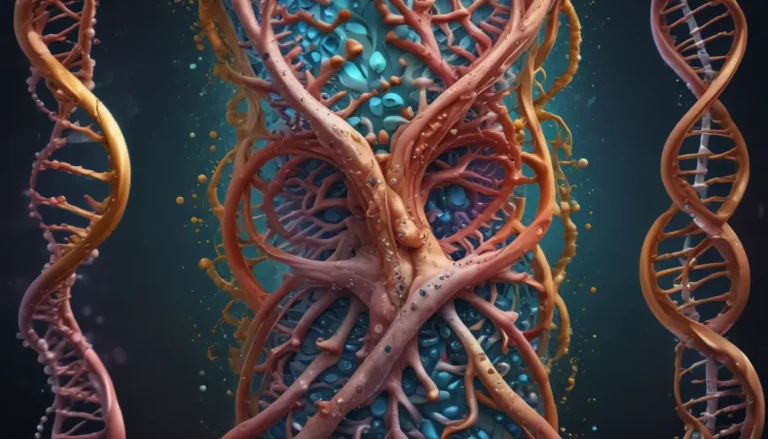A Note About Images: The images used in our articles are for illustration purposes only and may not exactly match the content. They are meant to engage readers, but the text should be relied upon for accurate information.
Welcome to the fascinating world of nutritional biochemistry, where the intricate relationship between food, nutrients, and the human body is unveiled. This branch of science delves deep into the molecular level to explore how the food we consume impacts our bodies. From nutrient digestion to cellular metabolism, nutritional biochemistry provides valuable insights into the complex processes that govern our health and well-being.
Understanding the Basics of Nutritional Biochemistry
Nutritional biochemistry is a scientific discipline that focuses on how the food we eat influences our bodies at a molecular level. By studying the chemical processes and interactions between nutrients and our cells, organs, and overall health, researchers gain a deeper understanding of the essential role that nutrition plays in maintaining optimal health.
The Crucial Role of Macronutrients and Micronutrients
- Macronutrients: Carbohydrates, proteins, and fats are the building blocks of nutrition, providing the energy needed for body functions and supporting growth and repair.
- Micronutrients: Vitamins and minerals, though needed in smaller quantities, are critical for enzyme activity, immune system support, and maintaining healthy bones, skin, and vision.
Unraveling the Bioavailability of Nutrients
The bioavailability of nutrients refers to the degree to which our bodies can absorb and utilize them. Studying bioavailability helps us determine the most effective ways to obtain and maximize the nutrition from our diet. By understanding how our bodies process and absorb nutrients, we can make informed dietary choices to support our overall health.
Harnessing the Power of Antioxidants
Antioxidants are compounds that play a vital role in protecting our cells from damage caused by free radicals. Found in fruits, vegetables, and other foods, antioxidants contribute to our overall health and well-being. Nutritional biochemistry explores how antioxidants interact with our bodies and helps us understand their importance in maintaining cellular health.
Exploring the Relationship Between Diet and Disease Prevention
Nutritional biochemistry investigates how specific dietary factors can influence the development and prevention of chronic diseases such as obesity, diabetes, cardiovascular diseases, and certain types of cancer. By studying the impact of diet on disease prevention, researchers can develop targeted strategies to improve health outcomes and reduce the risk of serious illnesses.
The Influence of Food Processing on Nutrient Content
Various processing methods, such as cooking, canning, and packaging, can alter the nutritional composition of foods. Nutritional biochemists examine how these processes affect the availability and efficacy of nutrients in our diet. Understanding the impact of food processing on nutrient content is essential for making informed food choices that support optimal health.
Personalized Nutrition Recommendations for Optimal Health
By studying individual variations in nutrient metabolism and genetic factors, nutritional biochemistry contributes to personalized nutrition recommendations. This approach helps tailor dietary plans to meet the specific nutritional needs of individuals, promoting optimal health and well-being. By understanding how our bodies process nutrients, we can make informed decisions that support our overall health goals.
Embracing a Balanced Diet for Wellness
A balanced diet that provides the right proportions of macronutrients, micronutrients, and other essential components is crucial for maintaining good health. Nutritional biochemistry emphasizes the significance of a varied and well-rounded diet for overall well-being. By ensuring we meet our nutritional needs, we can optimize our health and promote a healthy lifestyle.
Advancing Our Understanding of Food and Health
The field of nutritional biochemistry is continuously evolving, with ongoing research uncovering new insights into the relationship between diet, nutrients, and human health. By expanding our knowledge and guiding future recommendations for improved nutrition and disease prevention, nutritional biochemistry plays a vital role in enhancing our understanding of food and health.
Conclusion: Nourishing Your Body with Knowledge
In conclusion, nutritional biochemistry provides a wealth of knowledge about how our bodies process and utilize nutrients. From the essential role of macronutrients and micronutrients to the impact of antioxidants on cellular health, this field offers valuable insights into the intricate mechanisms that govern our health. By making informed dietary choices based on the latest research in nutritional biochemistry, we can optimize our nutrition, prevent disease, and promote overall well-being.
FAQs: Your Guide to Nutritional Biochemistry
-
What is nutritional biochemistry?
Nutritional biochemistry is a scientific discipline that explores the relationship between food, nutrients, and human health, focusing on how the body processes and utilizes nutrients. -
Why is nutritional biochemistry important?
Nutritional biochemistry provides insights into the optimal balance of nutrients needed for the body to function optimally, supporting disease prevention, overall health, and longevity. -
What are macronutrients?
Macronutrients are nutrients required in large quantities for energy production and growth, including carbohydrates, proteins, and fats. -
What are micronutrients?
Micronutrients are nutrients needed in smaller amounts for various physiological functions, such as vitamins and minerals. -
How does nutritional biochemistry impact dietary choices?
Nutritional biochemistry offers a scientific basis for making informed dietary choices, helping us optimize our food selections to meet our nutritional needs and health goals. -
What are some common applications of nutritional biochemistry?
Nutritional biochemistry is applied in dietetics, food science, research, and healthcare to develop personalized nutrition plans, study nutrient interactions, and assess the impact of nutrition on disease prevention. -
Can nutritional biochemistry help prevent diseases?
Yes, nutritional biochemistry plays a crucial role in disease prevention by understanding how nutrients influence cellular processes and the immune system to reduce the risk of certain diseases. -
How does nutritional biochemistry contribute to overall well-being?
Nutritional biochemistry contributes to overall well-being by highlighting the importance of a balanced diet and the impact of nutrients on physical and mental health, improving energy levels, mood, cognitive function, and quality of life.
In the realm of nutritional biochemistry, the possibilities for optimizing our health and well-being are endless. By delving into the extraordinary world of nutrient metabolism and understanding the intricate mechanisms that govern our bodies, we can make informed choices that nourish our bodies and promote longevity. Embrace the power of nutritional biochemistry to unlock a healthier, happier you.





